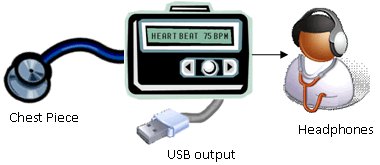College students design Linux-based stethoscope
Jan 15, 2008 — by LinuxDevices Staff — from the LinuxDevices Archive — 8 views A team of engineering students at Calvin College in Grand Rapids, Mich. is designing a digital stethoscope based on uClinux. The team, called “Rhythm Reloaded,” released a project proposal on the open source device, which runs Freescale's Coldfire MCF5275 CPU.
A team of engineering students at Calvin College in Grand Rapids, Mich. is designing a digital stethoscope based on uClinux. The team, called “Rhythm Reloaded,” released a project proposal on the open source device, which runs Freescale's Coldfire MCF5275 CPU.
The Rhythm Reloaded team is building the stethoscope as part of a senior design project. The team hopes its device will be the first electronic stethoscope able to record, filter, and store computer audio data from a medical patient.
The Rhythm Reloaded team hopes its design can improve upon traditional acoustic analog designs, by offering reduced ambient noice and higher recording quality. Audio files will use a format convenient for transfer to PCs via a USB interface.

Conceptual diagram of the Rhythm Reloaded stethoscope
In addition to the Coldire MCF5275 CPU, the device is equipped with a Crystalfontz 16×2 STN backlit LCD module, button interfaces, a Wolfson WM8731 audio codec, an electret microphone, and flash storage, all powered by a rechargeable Li-Ion battery.

Rhythm Reloaded team (left to right): Nathan Brinks, Ben Moes, Andy Gabler, David van Geest
Rhythm Reloaded's project proposal and feasibility study offers an instructive example of the complex planning and decision-making required to build a relatively simple embedded Linux device. The team steps the reader through each decision, detailing the many debates in selecting a physical design, operating system, distribution, microprocessor, storage medium, I/O, microphone, and more.
For example, the team had originally considered wireless technologies such as Bluetooth or Wireless USB, but decided these options added too much expense and could cause configuration problems. Wireless technologies also raised potential patient privacy concerns, and required more expensive cryptography, so they opted for USB instead.
For audio processing, the students decided that instead of using low-cost ADCs and DACs, they would go with a more expensive hardware codec due to its greater audio resolution. Interestingly, they decided on a Wolfson WM8731 codec instead of slightly better performing Analog Devices and NXP codecs, because the Wolfson was much better documented.

Rhythm Reloaded stethoscope block diagram
(Click to enlarge)
The team conducted an in-depth analysis on whether to go with a microprocessor, ASICs, FPGAs (field programmable gate arrays), or FPGAs with softcores. In the end they decided on a microprocessor due to factors such as ease of development, availability, and greater hardware abstraction capabilities. After winnowing the field based on a list of requirements, they chose a Freescale's Coldfire MCF5275 CPU, in part because the company donated an evaluation board to the project.
In choosing the operating system, the Rhythm Reloaded team quickly decided they wanted an open source OS because, as students, they needed the expertise and development resources of an open source community. They decided on Linux and specifically uClinux, a small-footprint variant of the Linux kernel targeting resource-constrained embedded applications. The team compiled the kernel using the GNU 68K/Coldfire C/C++ toolchain.
In explaining its OS choices, the team wrote in the proposal, “The Linux kernel is known to be secure, and it robustly handles multiple processes. Furthermore, because of its wide adoption in the embedded market, several different third-party software vendors provide Eclipse-based IDEs specifically for uClinux, and one of those vendors has donated a software license to the team.”
Should Rhythm Reloaded ever decide to develop the device for the commercial market, it will face additional challenges, such as FDA validation. Yet, if nothing else, they will have learned — and shared — some valuable lessons in embedded design.
The proposal and other project details may be available here.
This article was originally published on LinuxDevices.com and has been donated to the open source community by QuinStreet Inc. Please visit LinuxToday.com for up-to-date news and articles about Linux and open source.